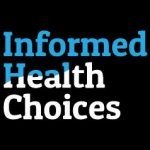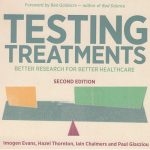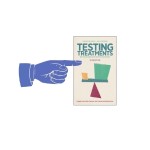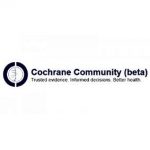
Informed Health Choices Podcasts
Each episode includes a short story with an example of a treatment claim and a simple explanation of a Key Concept used to assess that claim
| 1 Comment | Evaluated
10 Components of effective clinical epidemiology: How to get started
PDF & Podcast of 1-hr talk by Carl Heneghan (Centre for Evidence-Based Medicine, Oxford) on effective clinical epidemiology.
| 0 Comments
Testing Treatments
Testing Treatments is a book to help the public understand why fair tests of treatments are needed, what they are, and how to use them.
| 0 Comments
Testing Treatments Audio Book
The Testing Treatments Audiobook enables visitors to the TTi site to select whichever chapters in the book they would like to listen to.
| 0 Comments
John Ioannidis, the scourge of sloppy science
A 8 min podcast interview with John Ioannidis explaining how research claims can be misleading.
| 0 Comments
Science Weekly Podcast – Ben Goldacre
A 1-hour audio interview with Ben Goldacre discussing misleading claims about research.
| 0 Comments
Mega-trials
In this 5 min audio resource, Neeraj Bhala discusses systematic reviews and the impact of mega-trials.
| 0 Comments
More is less: an investigation of unnecessary testing
This is a US radio production about unnecessary testing and the associated harm to patients and costs to the health system.
| 0 Comments
Foreword by Nick Ross
This book is good for our health. It shines light on the mysteries of how life and death decisions are […]
| 0 Comments
On being sucked into a maelstrom
In 2006, a patient in the UK, who happened to be medically trained, found herself swept along by the Herceptin […]
| 0 Comments
A tragic epidemic of blindness in babies
‘In the period immediately after World War II, many new treatments were introduced to improve the outlook for prematurely-born babies. […]
| 0 Comments
Anecdotes are anecdotes
‘Our brains seem to be hard-wired for anecdotes, and we learn most easily through compelling stories; but I am aghast […]
| 0 Comments
Shared decision making: a consultation for a common condition
Doctor: Well, you have moderate osteoarthritis of the knees, which is common as people get older. It’s often referred to […]
| 0 Comments
A new treatment for strawberry birthmarks
Treatments with dramatic effects are occasionally discovered by accident. Take the example of a condition that occurs in infants called […]
| 0 Comments
Mother’s kiss
Low-tech approaches can have dramatic effects too. Young children sometimes place small objects – plastic toys or beads, for example […]
| 0 Comments
Imatinib for chronic myeloid leukaemia
Impressive results have also been seen in patients given imatinib for chronic myeloid leukaemia [4], [5]. Before imatinib was introduced […]
| 0 Comments
Laser treatment of portwine stains
The birthmarks known as portwine stains are caused by permanent and malformed dilated blood vessels in the skin. Commonly occurring […]
| 0 Comments
Breast cancer
The treatment of breast cancer provides another example of professional uncertainty. There is considerable variability in the use of surgery, […]
| 0 Comments
Antibiotics in pre-term labour
Fair tests of treatments with hoped-for beneficial effects, and which are assumed to be harmless, can show that neither is […]
| 0 Comments
Caffeine for breathing problems in premature babies
Large variations in the treatments used for a particular condition provide clear evidence of professional uncertainty about the relative merits […]
| 0 Comments
Genetic tests: sometimes useful, often dodgy
Not so long ago ‘genetic testing’ was more or less confined to generally rare, single-gene disorders – for example, the […]
| 2 Comments
Lung cancer screening: early but not early enough?
Screening may detect disease earlier, but not always early enoughto make a difference (see Figure). Some cancers, for example lung […]
| 0 Comments
Prostate cancer screening: clear harms with uncertain benefits
Prostate cancer is the second most common cancer in men worldwide,14 and broadly falls into two types. Some men have […]
| 0 Comments
Breast cancer screening: well established but remains contentious
Since routine breast screening with mammography is well established in many countries one could well assume that mammographic screening must […]
| 0 Comments
Abdominal aortic aneurysm screening: proceed with care
At the other end of the age spectrum, abdominal aortic aneurysm screening can also be beneficial. The aorta is the […]
| 0 Comments
Phenylketonuria screening: clearly beneficial
Newborn babies are routinely screened for an inherited disease called phenylketonuria (PKU). Babies with PKU are unable to process phenylalanine, […]
| 0 Comments
New – but is it better?
Key points Testing new is necessary because new treatments are as likely to be worse as they are to be […]
| 0 Comments
Foreword by Ben Goldacre
Medicine shouldn’t be about authority, and the most important question anyone can ask on any claim is simple: ‘how do […]
| 3 Comments
Action plan – 10 things you can do
Identify questions about the effects of treatment that are important to you. Learn to recognize uncertainty; speak up; ask questions; […]
| 3 Comments
Blueprint for a better future
Medical research could be done for the right reasons and could be done and reported well. Taken individually, none of […]
| 0 Comments
Produce unbiased and useful research reports
Even when studies are published, they often omit important elements that enable readers to assess and apply the findings. One […]
| 0 Comments
Publish all the results and make them accessible
Selective reporting of the results of research can lead to serious biases. Some ‘negative’ studies are never published when the […]
| 0 Comments
Design and conduct research properly
Stimulated by surveys revealing the poor quality of many reports of clinical trials, reporting standards have been developed and applied. […]
| 0 Comments
Ask the right research questions
Sometimes doctors do not know which treatment is likely to be best for their patients because the available options have […]
| 0 Comments
Research for the right reasons: blueprint for a better future
Key points: Ask the right questions Design and conduct research properly Publish all the results and make them accessible Produce […]
| 1 Comment
Shared decision-making
‘Shared decision-making has been defined as “the process of involving patients in clinical decisions”. The ethos is one where professionals […]
| 0 Comments
Where do we go from here?
These issues – about individual concerns and values, about understanding statistics and how they apply to individuals, and about the […]
| 0 Comments
9: How should people avoid being ‘labelled’ with an ‘illness’ and getting unnecessary treatments?
Medicine has made amazing advances: vaccines and antibiotics for preventing and treating infections; joint replacements; cataract surgery; and treatment of […]
| 0 Comments
8: Are there reliable sources of information that can be recommended?
There is no single information source for all diseases and treatments. To apply the principles in this book, readers may […]
| 0 Comments
7: What’s the best way of telling if the evidence (on the web or elsewhere) is reliable?
What should people look out for? Unfortunately there is no completely reliable simple marker for reliable information. If you are […]
| 0 Comments
6: If someone has a condition that is being studied in an ongoing clinical trial, how do they find out about this if their doctor doesn’t know about it?
Fewer than one in 100 people seeing a doctor will be enrolled in a clinical trial. The proportion varies widely […]
| 0 Comments
5: Won’t genetic testing – and ‘personalized medicine’ – mean doctors can work out the specific treatment needed in every individual and make all this unnecessary?
Although the idea of being able to work out the specific treatment needed in every individual is undoubtedly attractive, and […]
| 0 Comments
Don’t be fooled by eye-catching statistics
Let’s say the risk of having a heart attack in your fifties is 50 per cent higher if you have […]
| 0 Comments
4: How can someone know that the research evidence applies to them?
All decisions rely on previous experience of some kind – individual or collective. Fair tests of treatments such as randomized […]
| 0 Comments
3: Statistics are confusing – should patients really have to look at the numbers?
The way that numbers are presented can be very daunting – or even downright misleading. But if you really do […]
| 1 Comment
2: Although patients might want to know if a treatment ‘works’, suppose they don’t want all the details?
It is important to strike a balance between information overload and depriving people of enough information to help them make […]
| 0 Comments
1: Isn’t anything worth trying when a patient has a life-threatening condition?
It can be tempting to want to try the latest ‘wonder-drug’, or follow the example of some high-profile celebrity who […]
| 0 Comments
What might the ideas in this website look like for you?
Although no two consultations are identical, the guiding principles for how to arrive at the best possible decision, as set […]
| 0 Comments
So what makes for better healthcare?
Key points The “best” depends on your situation and needs. Your doctor should understand these, not just your . Sometimes […]
| 0 Comments
Mutilating surgery
Until the middle of the 20th century, surgery was the main treatment for breast cancer. This was based on the […]
| 0 Comments
Involving citizens to improve healthcare
‘The confluence of interest between advocacy groups, those who sell treatments, and those who prescribe them makes for a potent […]
| 0 Comments
Pester power and new drugs
‘New drugs by their very nature are incomplete products, as full information about their safety, effectiveness and impact on costs […]
| 0 Comments
Lay people help to rethink AIDS
‘Credibility struggles in the AIDS arena have been multilateral: they have involved an unusually wide range of players. And the […]
| 0 Comments
A key partnership
‘People-focused research in the NHS simply cannot be delivered without the involvement of patients and the public. No matter how […]
| 0 Comments
Patients’ choice: David and Goliath
‘Who has the power to see that research questions actually address the greatest needs of patients in all their misery […]
| 0 Comments
Working collaboratively bodes well for the future
There are numerous ways in which patients and the public can become involved in testing treatments. As we have already […]
| 0 Comments
Bridging the gap between patients and researchers
We drew attention above to problems that can result from patients becoming involved in testing treatments, and ways in which […]
| 0 Comments
Patients’ organizations: independent voices or not?
Another less well known conflict of interest exists in the relationship between patients’ organizations and the pharmaceutical industry. Most patients’ […]
| 0 Comments
How patients can jeopardize fair tests of treatments
In this sub-section: Introduction (this page) Patients’ organizations: independent voices or not? Bridging the gap between patients and researchers Introduction […]
| 0 Comments
Involving patients in research
How has this involvement of patients in research come about? In a previous section we showed, for example, how the […]
| 2 Comments
How can patients and the public help to improve research?
The formerly closed world of medicine is increasingly opening its doors to admit fresh ideas and former ‘outsiders’, and paternalism […]
| 2 Comments
Getting the right research done is everybody’s business
Key points Patients and researchers working together can help to identify and reduce Input from patients can lead to better […]
| 0 Comments
Psoriasis patients poorly served by research
‘Few trials involved comparison of different options or looked at long-term management. The duration of studies is unconvincingly brief in […]
| 0 Comments
All it takes is to find the gene
‘It’s . . . hoped that the genetic revolution will cure every problem known to man. We will be able […]
| 0 Comments
Dodgy, devious and duped?
Writing a light-hearted article for a Christmas edition of the British Medical Journal, two researchers created a spoof company called […]
| 0 Comments
Doctors and drug companies
‘No one knows the total amount provided by drug companies to physicians, but I estimate from the annual reports of […]
| 0 Comments
Impact of “me-too” drugs in Canada
‘In British Columbia most (80%) of the increase in drug expenditure between 1996 and 2003 was explained by the use […]
| 0 Comments
My experience of Magpie
‘I was really pleased to be part of such an important trial. I developed swelling at 32 weeks which grew […]
| 0 Comments
Who decides what gets studied?
Clearly this situation is unsatisfactory, so how has it come about? One reason is that what gets studied by researchers […]
| 2 Comments
Questions that are important for patients
Researchers in Bristol decided to pose a fundamental question: ‘To what extent are questions of importance to patients with osteoarthritis […]
| 0 Comments
Aprotinin: effect on bleeding during and after surgery
Research funders, academic institutions, researchers, research ethics committees, and scientific journals are all complicit in unnecessary research. As we explained […]
| 0 Comments
Stroke
Another example of unnecessary research, yet again because the results of preceding studies had not been gathered together and analyzed, […]
| 2 Comments
Respiratory distress in premature babies
Some research falls in between good and bad – it is plainly unnecessary. An example of such research concerns premature […]
| 0 Comments
Epidural analgesia for women in labour
The importance of assessing outcomes that matter to patients is clearly illustrated – in a very negative fashion – by […]
| 0 Comments
Psychiatric disorders
Regrettably, research is not always well done or relevant. Take the example of a distressing condition known as tardive dyskinesia. […]
| 0 Comments
HIV infection in children
The results of good research are also making a real difference to children infected with HIV (human immunodeficiency virus), the […]
| 0 Comments
Pre-eclampsia in pregnant women
Another outstanding example of good research concerns pregnant women. Worldwide, about 600,000 women die each year of pregnancy-related complications. Most […]
| 2 Comments
Stroke
Stroke is a leading cause of death and long-term disability. The death rate is between one in six and two […]
| 0 Comments
Research – good, bad and unnecessary
Key points Unnecessary is a waste of time, effort, money, and other resources; it is also unethical and potentially harmful […]
| 0 Comments
What research regulation should do
‘If ethicists and others want something to criticise in clinical trials, they should look at scientifically inadequate work, reinvention of […]
| 0 Comments
Academic nicety – or sensible choice?
‘Twelve years ago I crossed the line between clinician and patient when, at the age of 33 years, I found […]
| 0 Comments
A commonsense approach to informed consent in good medical practice
‘What is missing in the debate surrounding informed consent is the true nature of patient understanding, what information patients want […]
| 0 Comments
Rethinking informed consent
‘[Some] have come to suspect that informed consent is not fundamental to good biomedical practice, and . . . attempts […]
| 0 Comments
Biased ethics
‘If a clinician tries a new therapy with the idea of studying it carefully, evaluating outcomes, and publishing the results, […]
| 0 Comments
In an ideal world
‘In an ideal world, wherever possible, we could be gathering anonymised outcome data and comparing this against medication history, making […]
| 0 Comments
Who says medical research is bad for your health?
‘Most discussion about the ethics of medical research addresses the question of how research should be regulated. Indeed, medical research […]
| 0 Comments
What regulatory systems do not do
Although regulatory systems for research impose onerous requirements on researchers before studies start, there are many things they conspicuously fail […]
| 2 Comments
Information and consent
Requirements relating to provision of information and consent for studies are one of the ways in which the regulatory system […]
| 0 Comments
Do regulatory systems for testing treatments get it right?
Although the level of regulation can be reassuring, current regulatory systems impose very onerous burdens on anyone wishing to study […]
| 0 Comments
Regulating tests of treatments: help or hindrance?
Key points Regulation of is unnecessarily complex Current systems of research regulation discourage that would make for better healthcare Despite […]
| 3 Comments
Instructions to authors to put research in context by the editors of the medical journal The Lancet
Systematic Review This section should include a description of how authors searched for all the evidence. Authors should also say […]
| 0 Comments
Could checking the evidence first have prevented a death?
‘In a tragic situation that could have been averted, Ellen Roche, a healthy, 24-year-old volunteer in an asthma study at […]
| 0 Comments
Science is cumulative, but scientists don’t accumulate evidence scientifically
‘Academic researchers have been talking about something called “cumulative meta-analysis” for 25 years: essentially, you run a rolling meta-analysis on […]
| 0 Comments
Marketing-based medicine
‘Internal documents from the pharmaceutical industry suggest that the publicly available evidence base may not accurately represent the underlying data […]
| 1 Comment
The importance of systematic reviews
‘Systematic reviews and meta-analyses have become increasingly important in health care. Clinicians read them to keep up to date with […]
| 0 Comments
Synthesizing information from research
More than a century ago, the president of the British Association for the Advancement of Science, Lord Rayleigh, commented on […]
| 0 Comments
Why did you start?
‘Few principles are more fundamental to the scientific and ethical validity of clinical research than that studies should address questions […]
| 0 Comments
Reports of new research should begin and end with systematic reviews
The report of a study [20] to assess the effects of giving steroids to people with acute traumatic brain injury […]
| 0 Comments
Wasted resources in healthcare and research
Failure to do systematic reviews of relevant, reliable research evidence does harm even when it is not harming patients and […]
| 2 Comments
Avoidable harm to people participating in research
Failure to assess all relevant, reliable evidence can also result in avoidable harm to people who participate in research. Researchers […]
| 0 Comments
Avoidable harm to patients
Recommended treatments for heart attacks that had appeared in textbooks published over a period of 30 years were compared with […]
| 0 Comments
What can happen if all the relevant, reliable evidence is not assessed?
In this section Avoidable harm to patients Avoidable harm to people participating in research Wasted resources in healthcare and research […]
| 2 Comments
Recognizing vested interests and spin in systematic reviews
What if the reviewers have other interests that might affect the conduct or interpretation of their review? Perhaps the reviewers […]
| 3 Comments
Reducing the play of chance in systematic reviews
Previously, we explained how the play of chance can be reduced by combining data from similar but separate studies – […]
| 0 Comments
Identifying all the relevant evidence for systematic reviews
Identifying all the relevant evidence for systematic reviews – irrespective of the language or format of the relevant reports – […]
| 0 Comments
Reducing biases in systematic reviews
Just as biases can distort individual tests of treatments and lead to false conclusions, so they can also distort reviews […]
| 0 Comments
Systematic reviews of all the relevant, reliable evidence
Whilst it is easy to state that we should review the results of a particular alongside other relevant, reliable evidence, […]
| 0 Comments
Is one study ever enough?
The simple answer is ‘hardly ever’. Very seldom will one fair treatment comparison yield sufficiently reliable evidence on which to […]
| 1 Comment
Assessing all the relevant, reliable evidence
Key points A single rarely provides enough evidence to guide choices in healthcare Assessments of the relative merits of alternative […]
| 0 Comments
What does “statistically significant” mean?
‘To be honest, it’s a tricky idea. It can tell us if the difference between a drug and a placebo […]
| 0 Comments
Obtaining large enough numbers in fair tests of treatments
Sometimes in tests of treatments it is possible to obtain large enough numbers from research done in one or two […]
| 1 Comment
What does a “significant difference” between treatments mean?
Well, this is a trick question, because ‘significant difference’ can have several meanings. First, it can mean a difference that […]
| 2 Comments
Assessing the role that chance may have played in fair tests
The role of chance can lead us to make two types of mistakes when interpreting the results of fair treatment […]
| 4 Comments
Taking account of the play of chance
Key point Account must be taken of ‘the ’ by assessing the confidence that can be placed in the quality […]
| 1 Comment
The Yellow Card Scheme
The Yellow Card Scheme was launched in Britain in 1964 after the thalidomide tragedy highlighted the importance of following up […]
| 0 Comments
Believing is seeing
The British doctor Richard Asher noted in one of his essays for doctors: ‘If you can believe fervently in your […]
| 0 Comments
Mistaking the cure
. . .‘it is alleged to be found true by proof, that by the taking of Tobacco, divers and very […]
| 0 Comments
Generating and investigating hunches about unanticipated adverse effects of treatments
Generating hunches about unanticipated effects of treatments Unanticipated effects of treatments, whether bad or good, are often first suspected by […]
| 2 Comments
Fair measurement of treatment outcomes
Although one of the reasons for using sham treatments in treatment comparisons is to help patients and doctors to stick […]
| 2 Comments
Helping people to stick to allocated treatments
Differences between intended and actual treatments during treatment comparisons can happen in other ways that may complicate the interpretation of […]
| 2 Comments
Dealing with departures from allocated treatments
For all the reasons given so far in this section, you will have realized that fair tests of treatments have […]
| 2 Comments
Ways of using unbiased (random) allocation in treatment comparisons
Random allocation for treatment comparisons can be used in various ways. For example, it can be used to compare different […]
| 0 Comments
Unbiased, prospective allocation to different treatments
In 1854, Thomas Graham Balfour, an army doctor in charge of a military orphanage, showed how treatment groups could be […]
| 0 Comments